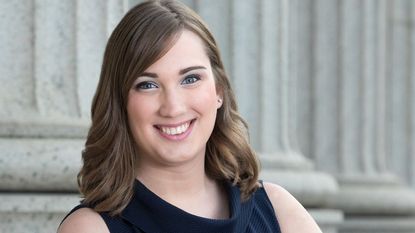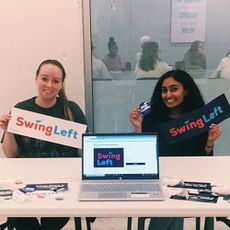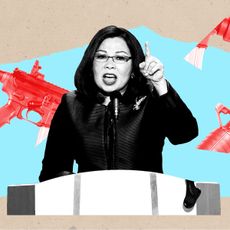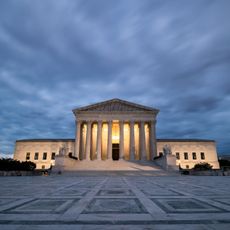

Nine days. That's how long it took Sarah McBride to announce she was running for state senate after Harris B. McDowell III, who has represented Delaware's first district since 1977, announced his retirement last July. Up until that point, the 30-year-old allowed her activism to guide her—she gained national attention in 2016 as the first openly transgender person to speak at a major party convention after helping pass Delaware's Gender Identity Nondiscrimination Act in 2013—and only began to think about running for office when the country experienced its blue-and-pink wave in the 2018 midterm elections. With this newly-open state senate seat that represents Wilmington, the district she was born and raised in, McBride saw an opportunity to make change in a new capacity—and it's already being reflected in the polls. McBride won her Delaware primary on September 15 and, thanks to the district's solidly blue leanings, is set to become the first openly transgender state senator in the country in November.
"This is a community that helped shape me into the person that I am. And it helped support me and sustain me through some of the most difficult challenges in my own life, from fighting for my rights down in Dover to the loss of my husband to cancer," McBride says. "In many ways, I've seen this community at its best—I've seen us live up to our values of kindness, respect, and care for one another. But I've also seen when we've fallen short."
McBride is referring to popular issues that the state has yet to address, like affordable health care and guaranteed paid family and medical leave, which have become even more essential during the COVID-19 pandemic. Ultimately, she wants to build a community that more fully lives up to "our values as a state of neighbors" and push for the policies that affect citizens' daily lives. That starts with passing legislation at the state level.
Here, in an exclusive interview with Marie Claire, McBride discusses her historic run, the issues she plans to tackle, and what's at stake in the 2020 presidential race.
Marie Claire: You're set to become the country's first openly transgender state senator. Talk to me about what that means to you.
Sarah McBride: For a lot of people in the LGBTQ community, and particularly the trans community, the 2016 Democratic National Convention was one of the first times that we saw ourselves, as trans people, celebrated and so clearly embraced as a part of our democracy. We had seen significant progress in the Obama-Biden administration, but that convention was really one of the first times that the Democratic party had so clearly and publicly embraced our cause as their cause. It was incredibly meaningful for me to have the opportunity to stand on that stage, to share my story, and to talk about the unfinished work of equality. Then, a year later, Danica Roem got elected. Another year later, three more trans people were elected to state houses. This year, there's an opportunity to double the number of out-trans people in state legislatures.
My hope is that the results of the primary election—and the results of the November election—are a reflection of the fair-mindedness of my neighbors, of the fact that this community looks at candidates for their ideas, for their experience, and for their energy, and they're not judging candidates based on their identities. They're judging candidates based on what they bring to the table and the opportunity for change that's before us.
Stay In The Know
Marie Claire email subscribers get intel on fashion and beauty trends, hot-off-the-press celebrity news, and more. Sign up here.
The second hope that's on my mind is that this election can help show a young kid struggling with their place in the world here in Delaware or North Carolina or Texas or anywhere that our democracy is big enough for them—that they can be themselves and the sky can still be the limit. I think about how meaningful it would have been for me as a young kid going to bed having just watched Danica Roem win an election, or going to bed having just seen the news that Delaware could potentially elect an out-trans person as a state senator.

McBride at the 2016 Democratic National Convention, where she became the first transgender person to address a national political convention.
MC: What specific issues do you plan to tackle should you win the state senate seat in November?
SM: I think what's really profound is that my identity is not something that has come up in conversations with neighbors. People are passionate and concerned with the issues that keep them up at night—the issues of health care and economic opportunity. The issues of quality education for their child. The issues of safety and dignity in their communities. From the start of this campaign, I've run on the issues that matter to me and my neighbors. I've been running to ensure affordable health care for every Delawarean. I've been running to guarantee paid family and medical leave for every worker. I've been running to build a public school system that serves every child, no matter their zip code. I'm running to reform and reimagine our criminal justice system. Those are the issues that I will be focused on as a state senator.
MC: What have been some of the more challenging aspects of your campaign amid the COVID-19 pandemic?
SM: At the start of this campaign, I never would have predicted the crisis that we as a community and as a country would face come 2020. One of the challenges has certainly been in making sure that we continue to reach voters safely and responsibly. The Trump Republican party is clearly indifferent (at best) to the global pandemic if they're actively trying to deny its full existence. The Trump Republican party clearly does not prioritize the health of our neighbors in the way that they're going about this election and governing.
So, one of the responsibilities I have felt as a candidate and as a potential legislator, is that we have to run this campaign in a way that protects public health. We moved to a virtual campaign when COVID hit. We went from door knocking to phone calls. And I'll tell you that the quality conversations and the connectedness I have felt with my neighbors throughout this campaign, it's taken a new form post-March, but it's still as deep and as widespread.
A post shared by Sarah McBride (@sarahemcbride)
A photo posted by on
MC: How are you balancing your position national press secretary for the Human Rights Campaign (HRC) while campaigning full-time?
SM: I've moved part-time in my role at HRC, and I intend on leaving that role come November should I win. That work has been incredibly fulfilling. I've learned working at HRC how to bring about change. I've seen how to make progress on seemingly intractable issues. I've seen our community and our country take change that once seemed impossible and make it a reality. The fight for equality isn't about some abstract moral principle. It's about making sure that everyone has access to a good-paying job, health care that meets their needs, a quality education, and safe communities that treat everyone with dignity. These are universal issues.
MC: In your primary victory video, you talked about how supportive and empathetic your parents have been throughout your life. What would you say to LGBTQ+ people who may want to run for office, but may not necessarily have that same support?
SM: Every LGBTQ person has within them the ability and capacity to run, and to run and win with the perseverance, the grit, and the authenticity that LGBTQ people demonstrate every single day in living our truths. Those are the necessary ingredients in running for office: perseverance, grit, and authenticity. So, regardless of who you are or where you come from, regardless of the family you were born into, every LGBTQ person should know that they inherently have a right to participate, and a right to have a seat at the table.
MC: We have so much further to go when it comes to trans rights—especially Black trans rights. How are you planning to push forward and amplify the Black Trans Lives Matter movement?
SM: The epidemic of violence that we see reinforces that all of these issues are interconnected. Racism, sexism, homophobia, transphobia, and economic opportunity are issues that connect. We can only address the needs of the most marginalized in our communities if we address the need for progress on all of these issues. So, that means building an economy that works for everyone, including those who live at the intersection of multiple marginalized identities. It means re-imagining community safety, so that we have a justice system that actually and truly protects the life and dignity of every person, including our neighbors of color. It means making sure that everyone has access to housing and health care.
The multiple prejudices that many people in our communities face are combined to push people out of stable employment and stable housing, and onto the streets and out of society's traditional mechanisms for safety and security. It puts people at greater risk of violence. So we have to elevate the voices of those who face the brunt of hate and discrimination and violence. And we have to honor their lives with meaningful action across the full range of issues.
Regardless of who you are or where you come from, every LGBTQ person should know that they inherently have a right to participate, and a right to have a seat at the table.
MC: Voter suppression is rampant in our country right now. What do you advise Delawareans—and all other citizens—do to make sure their vote gets counted?
SM: In this global pandemic, I encourage people to vote early, and to look online to see what opportunities they have to vote safely, responsibly, and early within their own state. But it can't just end with voting. We have to make sure that, after November, we are pushing forward legislation that protects the right to vote and expands the franchise at the state and federal level.
Here in Delaware, that means expanding access to the ballot box. It means ensuring that people who are reentering society [after incarceration] have access to the ballot box. It means making sure that it's easier to vote, regardless of whether we're in the midst of a global pandemic or not. Only if we do that will we honor the legacy of people like John Lewis, and will we be able to build sustained people power to push forward progress on all of the issues that affect us in our daily lives.
MC: What's at stake for trans rights should Donald Trump win reelection?
SM: For so many communities in this country, our lives, our dignity, and our rights are on the ballot. Our ability to access health care is on the ballot. Our ability to get a quality education free from discrimination is on the ballot. Our ability to get a job that pays the bills and offers real benefits is on the ballot. Our rights as workers, our rights as homeowners and renters, our rights as citizens, our rights as individuals, they are all on the ballot this November. The only way that we will ensure that the story of this moment isn't about Donald Trump but about all of us, is if we collectively show up in November in numbers never before seen to elect candidates who will ensure that our policies are influenced by compassion and empathy. Not hate and ego.
MC: If Joe Biden and Kamala Harris win the election in November, what do you think they should prioritize in the first 100 days?
SM: They are going to come into office facing the worst economy since the Great Depression, and the worst public health crisis in a century. Their first priority has to be getting us through this pandemic, but doing so in a way that builds back better and ensures that the economy that they build truly works for everyone. As we reimagine how we work, how we live, how we have fun, we must meet this moment with meaningful action and recognize that it's always been in our most significant challenges that we take our biggest steps forward.
This interview has been edited and condensed for clarity.
Related Stories


Rachel Epstein is a writer, editor, and content strategist based in New York City. Most recently, she was the Managing Editor at Coveteur, where she oversaw the site’s day-to-day editorial operations. Previously, she was an editor at Marie Claire, where she wrote and edited culture, politics, and lifestyle stories ranging from op-eds to profiles to ambitious packages. She also launched and managed the site’s virtual book club, #ReadWithMC. Offline, she’s likely watching a Heat game or finding a new coffee shop.
-
 Olivia Rodrigo Finds the Perfect Spring Dresses at Reformation
Olivia Rodrigo Finds the Perfect Spring Dresses at ReformationShe's worn the brand twice in the past week.
By Julia Marzovilla Published
-
 Curiously, Just as Meghan Markle Sends Samples of Her New Strawberry Jam Out, the Buckingham Palace Shop Starts Promoting Its Own Strawberry Jam on Social Media
Curiously, Just as Meghan Markle Sends Samples of Her New Strawberry Jam Out, the Buckingham Palace Shop Starts Promoting Its Own Strawberry Jam on Social MediaThe clip promoting the Buckingham Palace Shop’s product—we cannot make this up—is set to Mozart’s “Dissonance Quartet.”
By Rachel Burchfield Published
-
 Zendaya's Latest 'Challengers' Serve Is Nearly a Century Old
Zendaya's Latest 'Challengers' Serve Is Nearly a Century OldThe 1930s-era dress may have been pulled months ago.
By Halie LeSavage Published
-
 By Going Full "Trad Wife," Republicans Are Saying the Quiet Part Out Loud
By Going Full "Trad Wife," Republicans Are Saying the Quiet Part Out LoudSen. Katie Britt was picked to deliver the State of the Union rebuttal "as a housewife, not just a senator," one GOP lawmaker said.
By Danielle Campoamor Published
-
 36 Ways Women Still Aren't Equal to Men
36 Ways Women Still Aren't Equal to MenIt's just one of the many ways women still aren't equal to men.
By Brooke Knappenberger Last updated
-
 How New York's First Female Governor Plans to Fight for Women If Reelected
How New York's First Female Governor Plans to Fight for Women If ReelectedKathy Hochul twice came to power because men resigned amid sexual harassment scandals. Here, how she's leading differently.
By Emily Tisch Sussman Last updated
-
 Why the 2022 Midterm Elections Are So Critical
Why the 2022 Midterm Elections Are So CriticalAs we blaze through a highly charged midterm election season, Swing Left Executive Director Yasmin Radjy highlights rising stars who are fighting for women’s rights.
By Tanya Benedicto Klich Published
-
 Tammy Duckworth: 'I’m Mad as Hell' About the Lack of Federal Action on Gun Safety
Tammy Duckworth: 'I’m Mad as Hell' About the Lack of Federal Action on Gun SafetyThe Illinois Senator won't let the memory of the Highland Park shooting just fade away.
By Sen. Tammy Duckworth Published
-
 Roe Is Gone. We Have to Keep Fighting.
Roe Is Gone. We Have to Keep Fighting.Democracy always offers a path forward even when we feel thrust into the past.
By Beth Silvers and Sarah Stewart Holland, hosts of Pantsuit Politics Podcast Published
-
 Current Gun Control Policies Are Ableist
Current Gun Control Policies Are Ableist"Solutions" like active shooter drills and arming more people put the rights of gun owners above the rights of America's most vulnerable, including disabled people like myself.
By Heather Tomko Published
-
 The Supreme Court's Mississippi Abortion Rights Case: What to Know
The Supreme Court's Mississippi Abortion Rights Case: What to KnowThe case could threaten Roe v. Wade.
By Megan DiTrolio Published